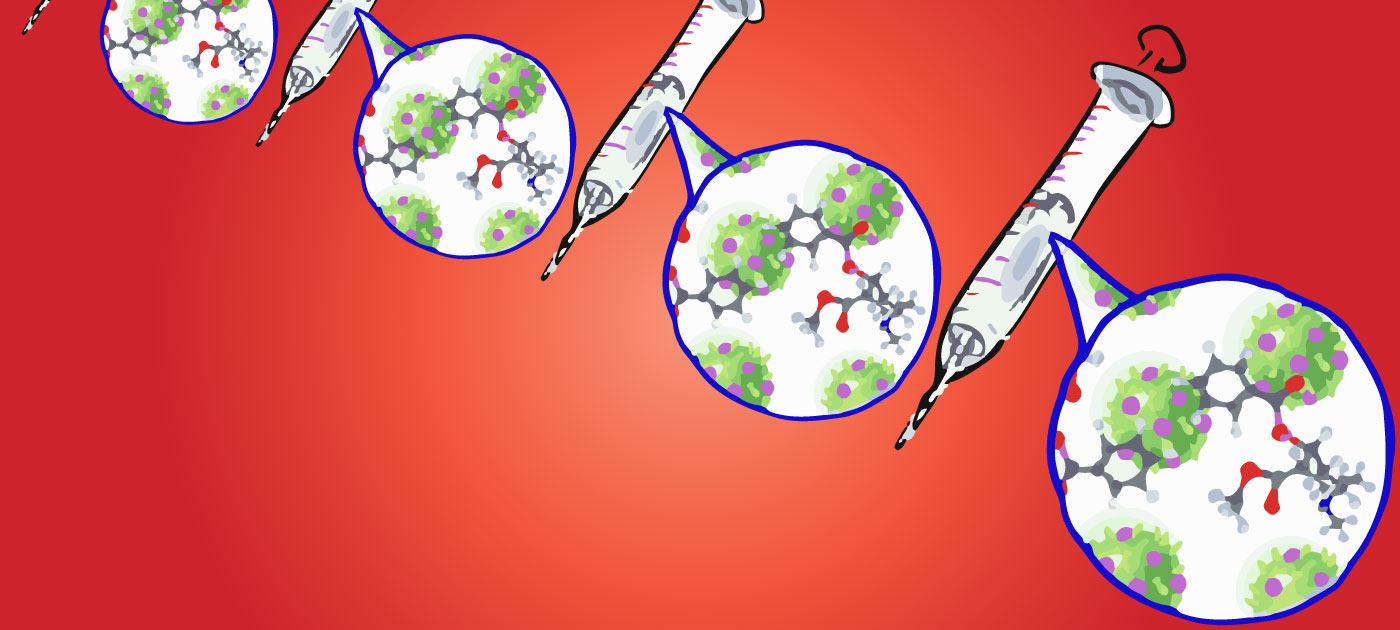In Brief:
- Cocaine is a small molecule used commonly as a recreational drug. It prevents the brain from removing “feel-good” chemicals so that the user experiences a drug high.
- A new vaccine could stop cocaine before it reaches the brain.
- The vaccine could offer an alternative approach to block the “euphoria” associated with drug intake.
Suppose you’ve started inhaling cocaine regularly. Any chance you could become addicted? “No way,” you scoff. Trying to convince yourself, you declare: “I’d stop before that happens, obviously.”
Unfortunately, it’s not that simple.
What is cocaine and what are its side effects?
Cocaine (benzoylmethylecgonine) is a tiny molecule obtained from South American coca plants. When inhaled, cocaine molecules cause dopamine, nicknamed the “pleasure neurotransmitter,” to accumulate in the brain. The user then experiences a temporary drug-induced euphoria.
However, it’s easy for users to become addicted. Once cocaine users start taking the drug regularly, the brain becomes less receptive to dopamine, causing the user to crave heavier and more frequent doses. Cocaine addicts experience harmful side effects, including nasal and bowel problems, weight loss, and increased risk of HIV/AIDS. Addicts may also experience a variety of mental health problems – from panic attacks to psychosis.
How are researchers helping to prevent cocaine addiction?
A vaccine directed against the small molecule drug, in development by researchers at Weill Cornell Medical College in New York, NY — including New Jersey’s own Martin J. Hicks — combines parts of the adenovirus (a virus implicated in about 5% of common colds) and a molecule similar in structure to cocaine. In their first studies involving animals, the vaccine is injected into the quadricep muscle of mice. The vaccine activates the immune system to create antibodies – proteins that fight off viruses and bacteria. Serum was collected and the antibodies that the mice produced in response to the vaccine were placed into small test tubes containing cocaine molecules. These vaccine-activated antibodies quickly attached and bound strongly to the cocaine, which meant that the immune systems of the mice had learned to see cocaine as an intruder. In effect, the body recognized cocaine as foreign.
The research team also performed studies on non-human primates to see if the vaccine could prevent administered cocaine from reaching the brain. Remarkably, cocaine occupancy in the brain was significantly reduced. This reduction is below the 47% threshold necessary to evoke the subjective ‘high’ reported in humans. The antibody binds to cocaine before it reaches the brain and inhibits the stimulatory effects of the drug. These stimulatory effects are often associated with the subjective high or ‘euphoria’ experienced by drug users.
What does this breakthrough mean?
In the United States, there are 1.4 million cocaine users and cocaine accounts for 24 percent of all drug-related visits to emergency departments. In one year alone, the United States spent an estimated $180 million on substance abuse and rehabilitation services. New strategies to treat the damaging effects associated with cocaine (and other small molecule addictive drugs) are needed.
This novel approach using a vaccine directed against cocaine may reduce the ‘euphoria’ and rewarding effects of cocaine in humans. This breakthrough may offer additional strategies to treat the damaging effects cocaine.
Works Cited
- “Cocaine Vaccine Passes Key Testing Hurdle.” Weill Cornell Medical College. Cornell University, 10 May 2013. Web. 21 Aug. 2015.
- “DrugFacts: Cocaine.” National Institute on Drug Abuse. National Institutes of Health, Apr. 2013. Web. 21 Aug. 2015.
- Lavitt, John. “Will a Cocaine Vaccine Keep Addicts from Using?” The Fix. The Fix, 3 Jan. 2014. Web. 21 Aug. 2015.
- “What Is the Scope of Cocaine Use in the United States?” National Institute on Drug Abuse. National Institutes of Health, n.d. Web. 21 Aug. 2015.
Katelyn McCreedy: Editor-in-Chief
Vivian Qiang: Creative Team Coordinator
Jenna Moldaver: Team Copy Editor
Sreya Das: Team Graphic Designer
Image Credits:
Feature Image: Graphic by Staff Illustrator Sreya Das
Story Image: “HELP” Graphic by Staff Illustrator Sreya Das
This article was written by Eileen Huang. As always, before leaving a response to this article please view our Rules of Conduct. Thanks! -cYw Editorial Staff

